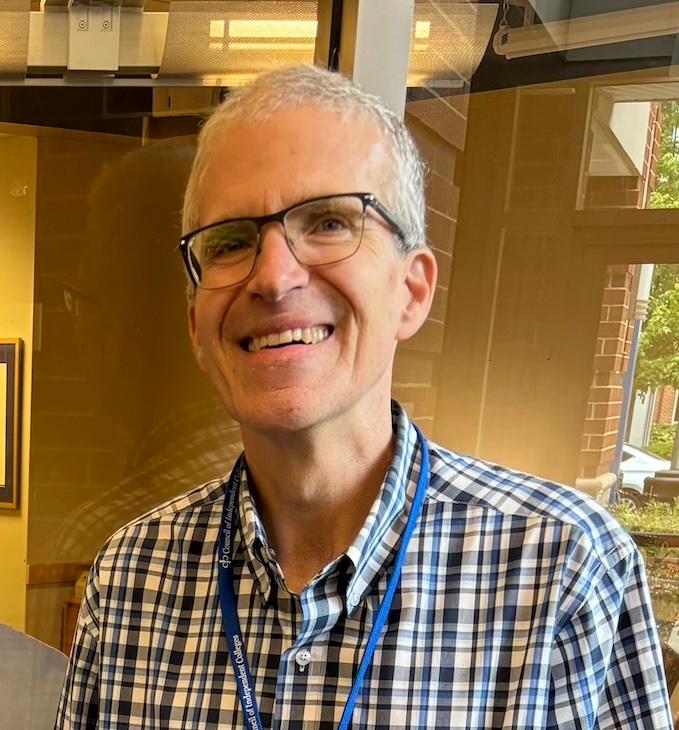
On Kevin Spooner’s (Associate Dean of Education) first trip to Chicago this summer, he learned some fundamentals of building bridges . . . and dined in a lions’ den.
Spooner first heard of the Teaching Interfaith Understanding seminar in June. The seminar was a collaborative effort of The Council of Independent Colleges and Interfaith America. The intention was to “broaden faculty members’ knowledge and perspective to help them strengthen the teaching of interfaith understanding, develop new courses and other resources, and expand the network of faculty members who are committed to teaching this subject,” according to its website.
Spooner, who arrived at WPU about five years ago after retiring from more than 30 years in K-12 education, was immediately interested in attending and eager to learn.
“I wanted to dive into research and do some thinking about what it means to work within an organization that promotes interfaith dialogue,” Spooner said.
The application process was competitive, and participants were required to be nominated by their chief academic officer. Because of a grant from the Lilly Endowment, Inc., lodging, most meals, and reading materials were provided. To his delight, Spooner was chosen to attend.
“It was an opportunity to collaborate with scholars from all over the country,” Spooner said.
Participants included academics and people who study religion and sociology, health care workers, and social workers, he said. And they were from diverse backgrounds.
“There were folks that identify as Muslim, Jewish, Sikh,” Spooner said. “It was interesting because (there was even) diversity among Christianity – evangelical, protestant, Catholic, Pentecostal. It was very interesting to hear all the perspectives about issues that come up. Most organizations have interfaith (clubs) on campus.”
DePaul University was the main seminar location, but on one of the days, participants met at the Lincoln Park Zoo. The boardroom where they gathered was inside the lion habitat, with a floor to ceiling view.
“There were lots of references to being in the lions’ den and finding similarities with Daniel’s story,” Spooner said. “It was really fun. We were on lunch break and the lions would come and look at us. They would come right up to the glass.”
The four-day seminar was led by Eboo Patel, founder and president of Interfaith America, and Laurie Patton, current president of Middlebury College, and soon-to-be president of the American Academy of Arts & Sciences.
“Each of the folks brought case studies of interfaith dialogue,” Spooner said. “The big one currently is the Gaza-Israel conflict and demonstrations on campuses.”
Spooner said Patton shared how she learned from an experience at Middlebury in 2017 where a controversial conservative speaker scheduled to speak was met with student protests that turned violent.
Middlebury students, like many others at universities and colleges around the world, demonstrated earlier this year for a ceasefire in Gaza. But unlike some outcomes, Middlebury’s demonstration stayed peaceful and there was communication between the students and the administration, which according to news reports, eventually led to the release of a joint statement.
The example, Spooner said, was that “we can learn how to deliberate in a civil manner and put things in place” that give students access to speak.
“They camped out on the quad, people brought food out for the students,” Spooner said. “(That’s just) one example of a case study. We took a lot of learning from that.”
Relevant to the work Spooner does with WPU students, he started thinking about preparing students to have interfaith conversations in the K-12 schools where they will work.
“How do we help our students look at their faith backgrounds,” Spooner said. “What can we do to support our students who are going out into student teaching – to be knowledgeable about their own traditions and the traditions of their students as well?”
A culturally responsive teacher puts the learner first, and there is a lot of relationship building involved, he said.
“We want our kids to have a great environment,” Spooner said. “We want everyone as much as possible to be able to pursue religious liberty and happiness. We can build some bridges between our faith backgrounds. Politics are more divisive, and religion is a part of that.”
Spooner is also thinking about how to have more collaboration with faculty on the WPU campus.
“There is a lot of research out there that religion supports mental health,” he said. “We have a current course, Human Faith and Service. The gist is to help students develop a more solid understanding of their faith. You might have to be firm about your beliefs but can listen to understand and to find some commonalities.”
Spooner is grateful he was able to take a week off from his usual duties of teaching bachelor and masters level courses and coordinating student teachers to focus on learning.
“It was beyond what I expected,” Spooner said. “It was better than I ever hoped. They gave us a stack of books to read. I’m still reading. They aren’t asking people to give up their faith traditions. They’re just asking, where can we agree with folks who see the world a little differently.”
